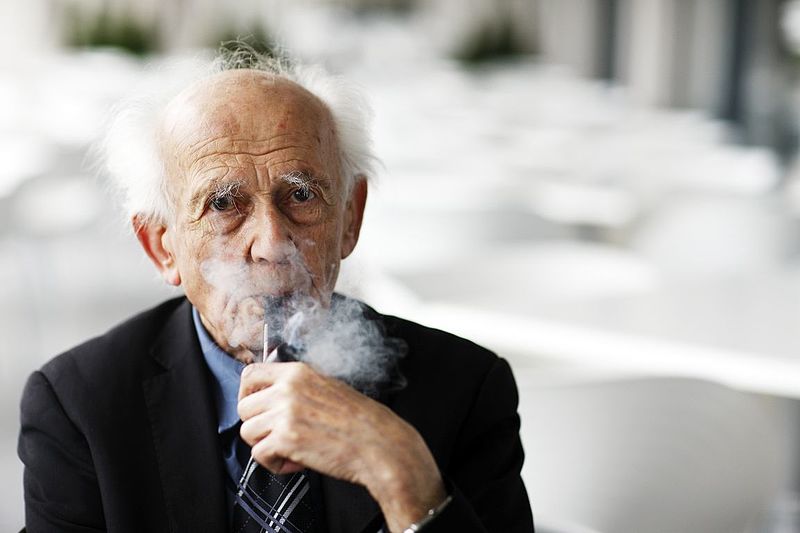Many people like to claim that Zygmunt Bauman was a pessimistic academician but for his new admirer, he was a realist. Bauman was skeptical of any serious egalitarian political change, his intellectual utterances always had an essence of faithlessness and dubiety for established structures and institutions. He was a canny witness of a new form of modernity which the transition between the 20th and 21st century brought about. His interpretation of modernity was full of doubt & individualism. The ingredients of this conception were major historical dramas staged on the global world eg. the death of ideologies. great migrations, economic depression of 2008 etc. It was not just these selected events that shaped Bauman’s intellectual sensitivity, instead, his whole life was amidst bedlam. This Polish-born servant of sociology was blessed with a long life and was born on 19 November 1925 in Poznan, Poland. He was equally abhorred by Nazis and Commies, for his continuous voicing against their political performativity. In his work ‘Modernity and Holocaust, Zygmunt Bauman noted, “Stalin’s and Hitler’s victims . . . were killed because they did not fit – they were eliminated so that an objectively better world—more efficient, more moral, more beautiful—could be established. A communist world or a racially pure, Aryan world”
The then Soviet Union became the place of refuge for Bauman and his family when the Second World War commenced. There he joined the Red Army to fight against the Nazis. Though later he returned back to Poland when normalcy was restored. In 1968 due to the anti-semitic campaign politick by the then communist regime, Bauman was made to leave Poland for the second time. His oeuvre depicts the reminiscence of personal plights he faced and the angst he witnessed.
Zygmunt Bauman and his ‘Liquid Sociology’
The recurring term of liquid in sociological literature is a synonym to Bauman’s intellectual comprehension. With the usage of expressions like liquid or liquidity, Bauman ardently hints to a shared world where there is a nonappearance of solid structures and institutions which once were the very foundation of the social.It is in this context that Bauman says, “all agreements are temporary, fleeting, and valid only until further notice.” For Bauman, the ramifications of the modern world are short-lived and not in concrete shape, whether it is fashion, ideology, aspirations, fear, dreams, etc. The endeavor to have a coherent self-identity in the epoch of liquid modernity remains unattainable because according to Bauman individuals are mere ‘tourists’ with a momentary social experience. He interpreted that the relationship between individuals and society is in a continuous flux because the foundational concepts such as identity, individuals, and individuality are turning obsolete. When Bauman asseverates to be “suitable for the global” he inkles to the idea that this epoch demands individuals to be more than just a consumer, it makes an insistence from individuals to be a competitive good. This means liquid modernity will not just compel you to buy a certain entity, instead, it subtly manipulates ones’ physicality.
Zygmunt’s supposition draws a crucial distinction between the older order which certainly had a ‘solid’ structure at its footing and a newer one which Bauman was witnessing had a ‘melting’ or ‘liquid’ structure. There remained many understandings on the analysis of the ancien regime like Marx scribbled that society was organized around economic relations or society is curated encompassing the notion of rationalization as Weber iterated. Bauman was different in his approach; he insisted that the newer order doesn’t contain any ‘solid’ architecture that has a definitional quality to describe the present world. Zugmunt Bauman noted, “Ours is…. an individualized, privatized version of modernity, with the burden of pattern-weaving and the responsibility for failure falling primarily on the individual’s shoulders. It is the patterns of dependency and interaction whose turn to be liquefied has now come. They are now malleable to an extent unexperienced by, and unimaginable for, past generations; but like all fluids they do not keep their shape for long. Shaping them is easier than keeping them in shape. Solids are cast once and for all. Keeping fluids in shape requires a lot of attention, constant vigilance, and perpetual effort – and even then the success of the effort is anything but a foregone conclusion.”
Politics and Power are Divorcing
Zygmunt Bauman notes “Society is no longer protected by the state: it is exposed to the rapacity of forces it does not control.”
Bauman stresses that the impression of unabridged sovereignty latched to the conception of State is losing its grip. The State as a political entity had ‘sovereignty’ at its core, but the advent of tripartite juggernaut phenomenon i.e. ‘capitalism’, ‘neoliberalism’, and ‘globalization’ altered the structure of the State that was curated in Westphalia, 1648. In the same vein, Fukuyama also stated that “traditional notions of sovereignty had always been something of a fiction.”
Privatization of public assets is one of the reflections where we can visibly observe the fading of the State as a sovereign entity. But arguments can very well emerge on how can we in the second decade of the 21st century understand the State and its functioning. The best reply to such type of questioning should revolve around forwarding a distinct category like intermediary state. By the conception of the intermediary state the author regards present form State in its liquid form if we borrow Bauman’s tenor. The liquid nature of the State is moving away from the processes of regulation, welfare, and governance to that of an agency that links international cooperations with the populace of the given territory and promotes transnational practices. The State in present times works on the celebrated principle of laissez-faire, where not only economy but also other state-citizen interactions is functioning on the structure curated at big economic centers.
Therefore Bauman rightly observed, “In a world governed by negative globalisation, all the underlying problems… are global, and being global, do not admit local solutions.”
Bauman’s Sociological Imagination
In his work What Use is Sociology, Bauman argues“maintaining the unending dialectical back and forth in the construction of ‘common’ sense by focusing on ‘everyday practitioners’ not the spokespeople of different professions.”
Every thinking brain maps its intellectual journey that one is visioning to traverse, Bauman too was having an approach towards the discipline and profession. In What use is Sociology Bauman considered doing Sociology as a conversation where one has to situate its lived experience within a broader historical setting. In order to satiate one’s sociological curiosity, Bauman maintains that an inquisitive mind has to defamiliarise the familiar and familiarise the unfamiliar.
He apprises to re-model the knowledge grasping tools so that the practitioners are able to sense the ever-changing social realm. Talking about the methodological contribution Bauman encourages to include everyday struggle at the mainstay of the deliberation. He also emphasized that in the present research realm where funding is a cardinal component there they are majorly serving the ‘managerial reasons’ and it lacks critical questioning. Bauman recommends the social scientist has to “embrace uncertainty, provisional claims-making, irony, and distance” (the characteristics of liquid modernity) while they are accomplishing their intellectual inquiry. Bauman was skeptical to fit his episteme under the enveloping canvas of postmodernism. For him, the conception of postmodernism diffuses an understanding where something gets ceased which was of relevance in modern time. In one of the interview, Bauman stated that,
“ I’ve some time ago distanced myself from the “postmodern” grid of the world-map” Alternatively, Bauman proposes the concept of liquid modernity, briefly discussed earlier. Bauman when stresses on the conception of liquid modernity he moves closer to Marx’s phrase penned in Communist Manifesto i.e. all that is solid melts into air’ is turning out to be literally true. He believed that nothing is ending as claimed by Postmodernists but rather entities are melting or getting liquefied.
This public intellectual who scribbled a lot on the fluidity of subjects in the modern world died on January 9, 2017.
Bhawesh Pant is a research scholar at Centre for Study of Social Exclusion and Inclusive Policies, Tata Institute of Social Science, Mumbai.
References:
-
Bauman, Z. (2000). Modernity and the Holocaust. Cornell University Press.
-
Bauman, Z. (2013). Liquid modernity. John Wiley & Sons.
-
Bauman, Z. (2013). Liquid times: Living in an age of uncertainty. John Wiley & Sons.
-
Fukuyama, F. (2016). Governance: What do we know, and how do we know it?. Annual
Review of Political Science, 19, 89-105.
-
Bauman, Z., Jacobsen, M. H., & Tester, K. (2016). What use is sociology?: conversations with Michael Hviid Jacobsen and Keith Tester. John Wiley & Sons.











